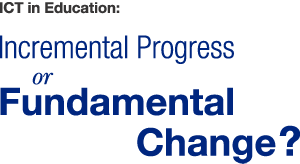Researchers throughout Media Lab Europe welcomed visitors and demonstrated ideas and technologies for transforming learning and education. In his address to delegates of the EU Presidency conference, Seymour Papert had called attention to one of them: Empowering Minds,
a project run by Deirdre Butler as a collaboration between MIT, MLE, and St. Patrick's College, Dublin City University.
This project supports students and teachers in primary and secondary schools throughout Ireland as they learn side-by-side about robotics and computer programming, in creative contexts that invoke and depend as much on arts, history, and culture as on science and engineering.
In Empowering Minds, children use computerized, mechanized LEGO to do engineering at the youngest ages. They first learn engineering, then from there they progress to learning the ideas behind it, and then they learn the mathematics.
This would be inventing � it�s a little probe toward inventing a different kind of content. It�s not a different way of teaching; it�s not pedagogy,
it�s different knowledge. It�s a good example of turning knowledge � turning learning � upside-down.
Instead of starting with this abstract stuff we had from the nineteenth century, let�s start with stuff that�s really engaging for the children,
out of which the deeper ideas can develop. - Seymour Papert
Originally 4 schools were involved in Empowering Minds, representative in size and socioeconomic range. The 9 teachers spanned a range of ages and experiences,
and included roughly equal numbers of men and women. The project has grown to include 13 schools and 29 teachers, particularly involving small rural and
disadvantaged schools, and is now growing beyond schools to an urban community. The number of children involved now exceeds 1200.
Ireland�s National Centre for Technology and Education, the Higher Education Authority, and
Diageo / Liberties Learning Initiative have provided funding.
|




